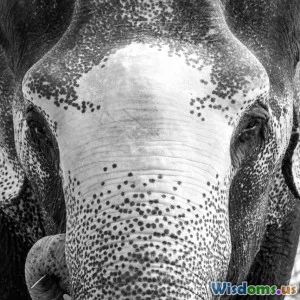
Inside Elephant Memories Are They Really the Smartest Mammals?
12 min read Explore the science behind elephant memories and intelligence, comparing them to other mammals. (0 Reviews)
Inside Elephant Memories: Are They Really the Smartest Mammals?
The phrase "an elephant never forgets" has embedded itself in our cultural tapestry, conjuring awe and a hint of whimsy. But is it mere mythology, or does the reality of elephant intelligence truly outpace other mammals? Unraveling the marvels of elephant memory and cognition not only broadens our understanding of these majestic creatures but deepens our appreciation for how intelligence evolves in the animal kingdom.
Elephant Memory: Myth or Mind-Blowing Fact?

Stories abound of elephants tracking distant watering holes across barren distances, recognizing humans after decades, or mourning at the bones of family members. Sound incredible? Fresh research supports much of what was once brushed off as folklore.
Landscape Navigation and Survival
African elephants roam home ranges sometimes exceeding 10,000 square kilometers. They must remember seasonal locations of food sources and water during droughts. One famous example comes from the late 1990s, when a severe drought struck northern Tanzania. The matriarch of a herd led her group over 50 kilometers away to a watering hole she had last visited over 30 years prior as a calf—a journey that ultimately saved her family. This suggests not only spatial memory but also remarkable temporal memory, spanning decades.
Individual Recognition and Social Memory
Elephants live in intricate matriarchal societies. Research from Amboseli National Park in Kenya has shown that individual matriarchs can remember up to 100 distinct elephants by scent, appearance, and vocalizations. Joyce Poole, a renowned elephant researcher, documented a case where a female elephant greeted the daughter of an old companion—even after 12 years apart. This social memory keeps group bonds strong and facilitates kin recognition, maintaining genetic diversity.
The Anatomy of Elephant Intelligence: What Makes an Elephant Brain Special?

An elephant's brain is the largest of any land mammal, weighing up to 5 kilograms (more than three times a human brain). But it's not size alone that breeds intelligence. The anatomy and neurobiology inside the elephant skull are equally fascinating.
Unique Brain Features
-
Highly Folded Neocortex: The elephant neocortex is highly convoluted, indicating more surface area dedicated to processing complex information, akin to primates and cetaceans.
-
Hippocampus Development: Responsible for spatial navigation and long-term memory, the elephant's hippocampus is notably well developed. This anatomical trait aligns closely with their documented memory feats.
-
Superior Hearing Processing: Elephants produce and recognize infrasound—low-frequency sound waves humans can't hear—that travel several kilometers. Neural adaptations ensure elephants process, store, and recall these landscape-level auditory cues.
Advanced Tool Use and Problem-Solving
It’s not just memory. Researchers in India observed captive elephants fashioning branches into fly switches or digging wells for water. The most compelling evidence came from a 2006 experiment by Dr. Joshua Plotnik and colleagues: an elephant named Kandula learned to move a cube to stand on and then reach inaccessible food—a hallmark of insight-based problem-solving, once believed exclusive to great apes and some corvids.
Comparing Elephant Intelligence Across the Animal Kingdom

Are elephants the smartest mammals? This is a nuanced challenge. Intelligence is multidimensional, and no two species are tested the exact same way. Yet, comparing their skills to other famously smart mammals is illuminating.
Elephants vs. Great Apes
Great apes, such as chimpanzees, are capable of tool use, complex communication, and even deception. They excel in tasks involving object permanence and even self-awareness. Elephants exhibit comparably advanced skills: they pass the mirror self-recognition test, use tools, and communicate with sophisticated rumbles.
Key Difference: Elephant intelligence is often collaborative—based on matriarch-led social structures—whereas apes sometimes focus on individual problem-solving. Both demonstrate empathy but use it differently.
Elephants vs. Dolphins and Whales
Cetaceans display notable intelligence: some dolphin pods have their own dialects, and killer whales transmit hunting techniques across generations. Elephants share linguistic flexibility and long-term problem-solving, along with ritual transference (like migration routes or mourning ceremonies).
Takeaway: While dolphins’ intelligence leans towards play and intricate social bonds, elephants emphasize hierarchies, guidance, and memory.
Elephants in Cross-Species Context
Few animals capable of recalling watering holes 30+ years later, recognizing individuals after decades, or mourning the dead with clear ritual, display memory or emotional intelligence on par with or exceeding elephants. Only certain humans, apes, dolphins, and corvid birds come close on specific cognitive dimensions.
Emotional Complexity: Empathy, Grief, and the Secret Life of Elephant Societies

What sets elephants apart is the emotional complexity that permeates their social existence.
Mourning and Ritual
Conservationists and field biologists have documented how elephants return to the skulls and tusks of their loved ones, caressing them gently for hours—sometimes days. In 2001, in Samburu, Kenya, an elephant calf orphaned by poachers was adopted and comforted by its aunts and cousins as they traveled, with multiple adults taking turns standing guard while it slept, a behavior rarely seen outside humans or closely related apes.
Cooperative Problem-Solving
In a 2011 experiment published in "Proceedings of the National Academy of Sciences," elephants quickly learned to cooperate to acquire food—one had to patiently wait for another’s synchronized action to get the treat, indicating an understanding of teamwork and patience. Contrast this with primates like chimpanzees, who can cooperate but often get impatient, derailing group tasks.
Expressing Empathy
Elephants have been witnessed consoling distressed companions with trunk touches and vocal rumbles, behaving warmly towards the suffering or the sick. These complex emotional responses aren’t the norm across the animal kingdom, signaling an intelligence rooted in empathy and kinship.
Researching Elephant Cognition: Modern Approaches and Key Discoveries

Modern science now employs innovative tools, from neuroimaging to GPS tracking, to unlock more secrets of elephant cognition.
Mirror Self-Recognition: “Who’s That Elephant in the Glass?”
Mirroring experiments—where a mark is placed on an animal in a spot only visible in a mirror—test for self-awareness. Elephants, like dolphins and great apes, recognize themselves and touch the mark, indicating self-concept.
Language and Communication
Dr. Caitlin O’Connell’s fieldwork in Namibia revealed elephants exchanging information through complex subsonic rumblings, interpreted by others via sensitive feet. Even subtle fluctuations in these calls can direct family members to hidden water miles away. Playback studies confirm that matriarchs’ alarm calls are trusted most, again underlining both memory and social learning.
Field Case: Solving the Beehive Fence
In many parts of Africa, farmers use beehive fences to keep elephants out of crops; elephants dislike bees and their stings. Within a year, herds in Kenya started finding roundabout ways through the mazes—demonstrating social learning and memory transfer to avoid stings and access food.
Conservation, Memory, and the Future of Elephant Intelligence
Understanding elephant memory and intelligence isn’t simply academic—it’s foundational for their conservation.
Passing Down Survival Skills
Elephant societies rely on matriarchal wisdom to avoid dangers, identify poacher territories, and remember poisoned water holes. Orphaned herds, led by young, inexperienced elephants, fare poorly—lacking critical survival knowledge, they are less likely to avoid human threats or find food in hard years. The future of elephant populations thus depends on preserving family structures and learned knowledge, not just genetics.
Technological Solutions and Community Engagement
GPS collaring tracks not just migrations, but learning patterns. Conservationists can now pinpoint where herds pass on key information and intervene if landscape changes hinder traditional routes. Public awareness campaigns highlighting the intelligence and emotional complexity of elephants inspire stiffer penalties on poaching and more public funding for protected areas.
The Ethical Imperative of Protecting Elephant Brains
As the world grapples with habitat loss and species declines, what are we risking when we lose elephant wisdom? Protecting ecosystems for these sentient giants isn’t just ethical—it's practical. Elephants shape landscapes, disperse seeds, and drive tourism economies. But above all, their sentient, social lives remind us there’s more to intelligence than just problem-solving: it's the nurturing, learning, and mourning that truly set elephants—perhaps the world’s most emotionally and cognitively advanced non-human mammals—apart.
As we continue to learn from these gentle giants, the tale of the elephant’s memory becomes less myth and more a lesson: that intelligence blooms in the bonds we nurture, the stories we carry, and the wisdom we share across generations.
Rate the Post
User Reviews
Popular Posts



















